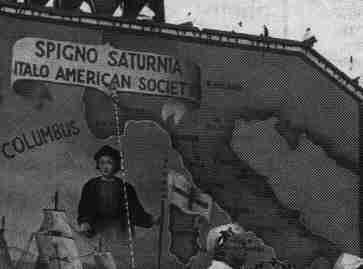 Christopher Columbus -
Hero or Zealot?
Christopher Columbus -
Hero or Zealot? Christopher Columbus -
Hero or Zealot?
Christopher Columbus -
Hero or Zealot?
Published 10/16/97
Perhaps the most controversial of all America's national holidays is Columbus Day, a day reserved for the navigator Christopher Columbus, who is renowned with American history despite the fact he never set foot on American soil.
Why then did Columbus become such a prominent figure in American history? Author Michael Kammen says that Americans, after successfully separating from England and forming its own independence, needed some icon in which to base their historical significance on.
Although some wanted to begin America's history with its founding fathers, i.e. George Washington or Thomas Jefferson, Kammen said that those who wanted revolutionary heroes elevated into folklore did not include the heroes themselves, because they believed that to be raised above others would be "undemocratic."
With a young America going through an identity crisis period, Kammen said a consensus was soon created to designate Columbus as America's identity. One of the major reasons for Columbus' selection was because he was able to escape the Old World.
In addition, several books were published shortly after America's independence that aided the quest to glorify Columbus. Philip Freneau's "The Pictures of Columbus" and Joel Barlow's 1787 "The Vision of Columbus" were only some of the written works about Columbus that were published in the late 1700s.
In 1829, a biography on Columbus' life was published by Washington Irving that portrayed Columbus as a heroic explorer. These documents were popular in America and were created after the discovery of some manuscripts about Columbus' life, which were written by one of his contemporaries. These two events helped mold Columbus even further into an American hero.
By the mid-to-late 19th century, it was widely believed that Columbus was the quintessential hero for America. Randolph Rogers, the sculptor of the Capitol's Columbus Doors, said, "Perhaps there is one man (George Washington) whose name is more intimately connected with the history of this country or who better deserves a lasting monument to his memory than Christopher Columbus."
Other tributes to the explorer were done in later years. Decorated in the President's Room of the Senate Wing in 1859 was a ceiling decoration of Columbus called "Christopher Columbus - Discovery," and in the east corridor of the Senate Wing is Paul Wayland's "Columbus." The height of Columbus' praises when President Franklin Roosevelt designated Oct. 12 as Columbus Day - a national holiday.
That was then, this is now.
Five hundred years later, some publics have stripped Columbus of all positive symbolic meaning, saying instead he was the pioneer not of heroic travel but instead of genocide, hate and overall guile. According to American Indian activist Russell Means, "Columbus makes Hitler look like a juvenile delinquent," while Historian Glenn Morris said that Columbus was "a murderer, a rapist, the architect of a policy of genocide that continues today."
Other negative remarks about Columbus include Literary scholar Stephen Greenblatt saying that Columbus "Inaugurated the greatest experiment in political, economic, and cultural cannibalism in the history of the Western world," and African-American writer Ishmael Reeds asks, "Could it be that the human calamity caused by the arrival of Columbus was a sort of dress rehearsal of what is to come as the ozone becomes more depleted, the earth warms, and the rain forests are destroyed?"
Even pop culture from time to time displays personal messages about their feelings toward the explorer. For example, a movie titled "Higher Learning" dealt with racially charged situation at a college which its name was Columbus University. Also, rap group Public Enemy has a song from their 1994 album comparing Columbus Day to "Hitler Day."
Animosity toward Columbus can be felt even on a local level. On Sunday, Oct. 12, a 50-foot high Christopher Columbus memorial was vandalized in Oakland-based Schenley Park. On its granite base, the words "Stolen land" and "Murderer" were spray painted.
Point Park College students have mixed feelings of the Italian explorer. "How can a person discover another land when people already lived there and then claim it?" Maurice Eberhardt, a legal studies major said. "The history books just give a positive interpretation. They don't tell you how they robbed, murdered and raped the people already there."
Psychology major William Wadsworth is less critical in his evaluation of Columbus. "I think he gets credit for things he didn't accomplish. I think he was daring and brave for taking that trip. Back in his era he was a hero, but we're judging him in our era. We're using today's morals to judge his past." he said.
The Pittsburgh Post-Gazette commented in a recent editorial that "there is nothing wrong in considering what the European arrival meant to the world, for good or ill. But it is small-minded arrogance to blame Christopher Columbus for all that went after."
Caption: Whether or not you agree that Columbus was a hero, his holiday is still celebrated by many nationwide. Parades like this one in Pittsburgh can be found throughout America. Photo by Cecilia Scahill.
Click here to return to feature index.